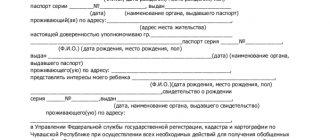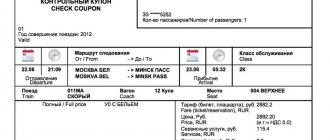Conditions and grounds
There can be many reasons for deregistering a child. Let's note the most common ones:
- parental divorce;
- buying a home;
- moving to another locality
Etc.
There is only one condition that determines the need for discharge. This is a legal requirement. In the Civil Code, in part two, article 20, it is established that a minor who has not reached 14 years of age must be registered at the place of residence of his parents or his guardians. The following may serve as grounds for deregistration of a registered child:
- consent of the parents, one of them, for registration, discharge of the child;
- does not live at the address specified during registration;
- guardianship resolution;
- the court's decision.
Next we will talk about how to discharge a minor child from the owner’s apartment.
Property owner and registered children
Minor citizens are registered at the place of registration of their parents, who can be both owners of residential property and its tenants. When purchasing a home and registering there, parents are required to register their minor children as well. If this is not done, their removal from their previous place of residence will be considered illegal.
In addition, if children owned part of the housing at their previous place of registration, new housing is purchased using them as well. This is monitored by the guardianship and trusteeship authorities , which give permission to transactions for the alienation of real estate in the interests of the child.
You can register children in a rented apartment:
- With the consent of the owner;
- In accordance with the provisions of Article 20 of the Civil Code of the Russian Federation.
The owner of the property does not have the right to accommodate a citizen without registration. He will suffer administrative punishment and may be subject to a fine of up to 50 rubles. (fine for legal entities). Permission to register is given in the form of a written application to the territorial body of the Federal Migration Service (FMS). Additionally, a lease and registration agreement may be drawn up, which specifies the conditions of residence and termination of the agreement.
Regardless of the conditions specified in the agreement, the tenant has the right to register a minor child at his place of registration.
The provision of Article 20 of the Civil Code of the Russian Federation indicates that the following people live with their parents and guardians :
- Young children;
- Citizens who are under guardianship.
This gives parents the right to register their child in rented residential premises. This provision allows children to move into an apartment that is pledged to the lender under a mortgage agreement.
If the borrower falls behind on payments, the terms of the agreement may allow him to be discharged and evicted. But a registered child complicates this procedure and makes it impossible. The standard loan agreement prohibits registering minors as collateral, but the provisions of civil law are more important than the terms of the agreement.
Does he have the right to expel minors?
This is possible if there are compelling reasons. The legislator includes the following:
- Change of owner of an apartment as a result of its sale or other alienation transaction;
- The emergency condition of an apartment building that is being demolished;
- Illegal registration and residence in the premises;
- Unauthorized redevelopment;
- Gross and systematic violation of the rights of other residents;
- Termination of family relations between the owner of the apartment and the person with whom the children live.
Forced deportation is carried out only by court decision and in the manner prescribed by law. Arbitrariness is not allowed.
If a child is registered with a parent-tenant, expulsion is possible either after the end of the lease agreement and registration period, or by court decision . The first option is recommended. As a rule, in the registration application the period of registration indicated coincides with the rental period.
General information about whether it is possible to remove a child from an apartment without the mother’s consent is described in this article.
Parents or guardians may voluntarily discharge a minor child. In this case, the following conditions must be met:
- The property rights of the child are respected.
- He is not being discharged “to nowhere.”
- De-registration and registration in a new place is carried out together with a parent or guardian.
If we are talking about buying an apartment in which children are registered, but they do not have direct ownership rights to the housing, the purchaser must take into account some features. Thus, a child has the right to claim housing sold by his parents by right:
- Inheritance;
- Mandatory share;
- Use.
If the court finds that the sale of housing did not take into account the rights of children, the transaction may be declared invalid.
For this reason, the answer to the question of whether the owner can discharge a child, and alienation transactions where children are involved, must be treated with caution. It is recommended to involve housing lawyers who will advise on how to properly conduct the transaction and discharge the children.
Where should I contact?
The FMS deals with registration and deregistration issues. Therefore, you will have to go either to the nearest branch of this service, or to the passport office of the house management, management company. If, of course, it is provided for in the structure of these organizations. In some cases, before contacting the passport office, you will first have to obtain permission from the guardianship authorities.
Can the owner remove a minor child, be it a son or daughter, from the apartment? Can I do this as a parent? It is impossible to discharge a child if his living conditions worsen. The guardianship closely monitors that his rights are not violated as a result of his discharge.
If the housing is municipal, then you will have to go to the guardianship for permission in any case.
If a minor is discharged from a privatized apartment, then only when he is the owner of part of the housing or the owner of it. Otherwise, it is not necessary to apply for guardianship.
We must remember, and this is important, that when a minor child is removed from an apartment, if he is not the owner, a municipal apartment always involves going to court. Only he has the right to decide to cancel the registration of any citizen, and especially a minor, in municipal housing.
But the court will not accept the claim for the child’s discharge if he is the owner of a share of the apartment or the owner of it.
Does the owner have the right to expel a child from his apartment?
The legislation establishes the right of citizens to independently dispose of real estate. At the same time, the alienation of housing is carried out after deregistration of all those registered in it. It is not difficult to discharge children who have reached the age of majority. If this is the place of residence of persons under 18 years of age, the owner will face several difficulties:
- the discharge procedure must not violate the rights of the minor. If this fact is present, registration is restored;
- discharge of young children and adolescents is carried out in the presence of their legal representatives - guardians or parents;
- For a child under 14, only parents can sign papers;
- children aged 14-18 years old draw up documents in the presence of their representatives;
- if there are two parents, they both agree to change their place of registration;
- the issue of re-registration of children registered with relatives in the event of parental disagreement is decided by the court;
- Children under 14 years of age are discharged with their mother and father.
Read also: Field registration of marriage
Due to the need for children to attend school, it is sometimes necessary to prove that the new place of residence will be in the same area. If this clause is not observed, permission from the guardianship authorities is required. The procedure applies to the child’s renunciation of property rights.
If the person is under 18 years of age
The owner must familiarize himself with the provisions of the law:
- Art. Civil Code - establishes that a son or daughter under 18 years of age can live only with their parents or with one of them;
- Family Code - determines the right of a minor child to live together;
- Housing Code - prescribes housing standards per person, which are also valid when children’s registration changes. It also establishes a preferential right to registration without the consent of the owner;
- Convention on the Rights of the Child - protects the right of minors to housing.
Employees of the passport office and other authorities are guided by presidential decrees and federal laws when carrying out operations involving the registration of children.
Convention on the Rights of the Child
After 14 years
Persons from 14 to 18 years old retain the rights of minors. The discharge of a child is subject to legal provisions applicable to citizens under 18 years of age. The difference is that the requirements of Art. Civil codes on cohabitation with parents are not taken into account.
What do you need or what documents will you need?
It is much more difficult to discharge a child from an apartment than an adult.
If it turns out that after deregistration, the living conditions, material and housing, of the minor have worsened, then this legal action, deregistration, will be canceled, and the citizens who carried out them may be punished.
The Civil Code (Article 20) establishes that a child must live, and, therefore, be registered, only at the place of residence of his parents or persons exercising guardianship over him or her guardians. His living conditions after cancellation of registration at his previous address should, at a minimum, be no worse than before.
If the child is not the owner of the property or is being discharged from a non-privatized apartment, then before deregistration, you must obtain permission from the guardianship authorities. For this you will need the following documents:
- passport of the parent, guardian or other person who is discharging the child;
- documents for an apartment or other housing. If the apartment is municipal, then a social rent agreement or warrant. Privatized - certificate of ownership It will be necessary to submit documents for both homes: where the child is moving and from where he is leaving;
- personal account;
- registration certificate for housing. Also for both apartments, from where he moves and where he registers;
- certificate of all residents living at the deregistration address;
- passport of a minor if he has reached the age of fourteen;
- statements from parents or guardians;
- application of a child if his age exceeds 14 years.
In custody, materials are reviewed within two weeks, that is, 14 days. If the extract is allowed, then you need to present the following to the passport office:
- permission from the guardianship authorities;
- passport of the tenant or owner;
- birth certificate or passport of the minor;
- if the housing is not privatized, then a warrant, a social rent agreement. Own - certificate of ownership;
- departure slip.
The share in the property or his property, that is, the apartment, will have to be redeemed. Funds must be credited to the child’s personal account. An extract from his personal account must be presented to the guardianship authorities.
If there is a need to carry out an extract through the court, then the following will be added to the package of documents that are provided to the guardianship authorities:
- consent of the child himself, if he is over 10 years old;
- extract from the Unified State Register of Real Estate, if the housing is privatized;
- divorce certificate or documents confirming the termination of family relations;
- certificate of actual residence of the child;
- statement of claim;
- receipt of payment of state duty.
Required documents
In any case, to implement the plan, it is necessary to submit the following documents:
- passports of representatives;
- birth certificate;
- documents for a new living space (certificate of ownership or social tenancy agreement);
technical documents for the old and new apartment;- permission issued by the guardianship and trusteeship authorities;
- statement;
- certificates about those living or registered in the living space;
- other documents depending on the nuances of a particular case.
The final list of papers depends on the type of property, the status of the minor (owner or not) and other features of the case.
Step-by-step instruction
So, how to expel a minor child from an apartment: at the first stage, you need to familiarize yourself with the current legislation so as not to get into trouble. Then you need to prepare a package of documents and try to resolve the dispute before trial.
In this article you will find out whether it is possible to discharge a child from an apartment to nowhere, from father to mother. If you want to learn how to evict your wife and child from your apartment, go here. This can be done without the consent of the minor, as well as without the consent of the parent.
How to draw up a claim correctly?
When deciding how to discharge a child from an apartment, know that the application is written in any form. However, the text must describe the current situation and contain references to the legislation governing issues of registration and deregistration, the Law on the Protection of Children's Rights.
The claim must end with a demand to recognize the right to living space as lost and with a request to oblige the defendant to register the child at his actual place of residence.
You will have to pay a fee of 200 rubles.
The claim is considered within one month.
The court decision is being challenged in a higher authority. In the case of a magistrate's court - in a court of general jurisdiction.
Very often our readers ask a question about the topic of discharging an ADULT child from an apartment. Dear visitors! Adult children are already adults, so the standard eviction algorithm applies to them. You can read about it in our section about leaving an apartment.
Specifics of some points
One of the specific points is the discharge “to nowhere” . It is prohibited by law, but some deviation from this provision is allowed. Applies in the following case:
- The apartment is for sale;
- A share in it belongs to the child as property;
- No new housing has been purchased.
The way out of this situation is as follows: the circumstances are described when submitting an application to the guardianship and trusteeship authorities, a special current account is opened to which an amount equivalent to the share of ownership in the sold housing is transferred. When purchasing a new apartment, money from this account is used. The child takes ownership of part of the real estate purchased with his funds.
Extract from a private home
All requirements and conditions described above are met. Discharge problems arise if the child moves into an apartment. When submitting an application to the guardianship and trusteeship authorities, they may consider that conditions for children are deteriorating - as a rule, the living area of the house exceeds the number of square meters in the apartment.
You can read more about how to expel a person from home without his consent in a new article prepared by our editors.
Along with technical (cadastral) passports for housing, which do not indicate in favor of the decision made, you must submit:
- Certificates from their district administration (new and the one from which they are moving) about infrastructure, the availability of educational and sports institutions for children, etc.
- Conclusion of specialists on repairs in new housing and a private house from which the move is being carried out.
- Other documents.
These materials should indicate that the child is moving to a better place and will have access to benefits that he will not have at his current place of residence. Having more square meters is not the only criterion by which real estate is compared.
In case of divorce
Problems do not arise if the parents come to a general agreement about the child’s place of residence. As a general rule, he remains to live with his mother or father, is discharged or remains in the apartment with them . At the same time, other conditions are met: registration in not the worst housing, observance of ownership rights to the apartment (if the share in it belongs to the children), consent of both parents to the discharge. If the former spouses do not reach a common opinion, the issue is transferred to the court.
A special material has been prepared on the topic of how to remove an ex-spouse from an apartment after a divorce; we recommend that you read it.









